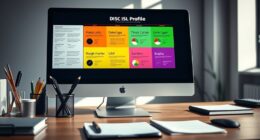You can ace the "Tell Me About Yourself" question using a ready-made script that captures attention. Start with a brief intro about who you are, then highlight 2-3 key experiences or skills that align with the role. Keep it engaging by sharing specific examples that demonstrate your expertise and enthusiasm for the position. A strong conclusion ties your career goals to the company's mission, leaving a lasting impression. Avoid common pitfalls by staying relevant and concise. There's much more to uncover that can help you perfect your response and boost your confidence.
Key Takeaways
- Start with a brief introduction, stating your name and background, to set the tone for your response.
- Highlight 2-3 relevant skills or experiences, including quantifiable results that align with the job description.
- Discuss your current role, emphasizing its relevance to the opportunity you're pursuing.
- Conclude with your career goals that align with the company's mission to demonstrate a strong fit.
- Practice your delivery for clarity and confidence, engaging the interviewer with positive body language.
Understanding the Question

When faced with the question "Tell me about yourself," it's important to recognize its purpose. This question serves as an icebreaker in the interview, allowing you to share your background while showcasing your communication skills. It invites you to summarize your professional experience and highlight relevant experiences that align with the job description.
A well-structured approach often follows the Past-Present-Future formula, giving your answer a logical flow. You can start by discussing your past roles, then shift to your current position, and finally, touch on your future aspirations. This structured response not only helps you articulate your skills effectively but also demonstrates your self-awareness and ability to prioritize information.
Tailoring your answers to reflect the company values is essential for making a strong first impression. By aligning your background and achievements with what the employer seeks, you enhance your chances of resonating with the interviewer. Ultimately, understanding the question allows you to deliver a concise, impactful response that sets a positive tone for the remainder of the interview.
Crafting Your Response

Finally, express genuine enthusiasm for the role and how your background makes you a strong fit. For example, say, "I believe my proven track record of achieving quantifiable results and my passion for collaboration align perfectly with your company's goals." Additionally, showcasing your strong communication skills will further emphasize your ability to build rapport and effectively contribute to the team.
Structuring Your Answer

Structuring your answer effectively sets the tone for a memorable introduction. Use the Past-Present-Future formula to create a logical flow. Start with a concise introduction that includes your name, professional background, and notable achievements to capture the interviewer's attention. This is your chance to showcase your relevant background.
- Highlight 2-3 key skills or experiences that align with the job.
- Incorporate quantifiable results from past roles to demonstrate your impact.
- Discuss your current role and how it prepares you for this opportunity.
- Connect your career goals to the company's mission and values.
- Wrap up by reinforcing your commitment to the role and organization.
Key Elements to Include

A strong response to the "Tell me about yourself" question includes several key elements that make your introduction memorable and relevant. Start with a brief introduction, mentioning your name and current job role, highlighting how it aligns with the position you're interviewing for.
Next, tell the interviewer about your relevant work experience. Focus on key responsibilities you've held and any achievements, ideally using quantifiable results to show your impact. For instance, if you increased sales by a certain percentage, be sure to mention it.
Then, discuss your educational background. Share degrees or certifications that are pertinent to the job and connect this knowledge to your relevant skills.
Don't forget to incorporate your personal interests or hobbies. These should showcase your personality and relate to teamwork or leadership, helping to create a connection with the interviewer.
Finally, conclude with your career goals. Express how they align with the role and the company's objectives, showing your enthusiasm for professional development within the organization. This structured approach guarantees your response is clear, concise, and impactful. Additionally, demonstrating an understanding of financial management principles can further highlight your analytical skills and decision-making capabilities.
Common Mistakes to Avoid

When preparing your response to the "Tell me about yourself" question, it is crucial to steer clear of common pitfalls that can undermine your effectiveness. Avoiding these mistakes will help you present your qualifications more convincingly and enhance your suitability for the role.
- Don't focus solely on your personal life; tie it back to relevant job experience.
- Make sure to mention specific skills or accomplishments that align with the job requirements.
- Keep your account concise; providing an overly detailed history can obscure your key points.
- Structure your answer in a clear and coherent manner to maintain the interviewer's interest.
- Show enthusiasm for the role and the company; neglecting this can negatively impact the interviewer's perception of you.
Tailoring for Different Industries

Tailoring your "Tell me about yourself" response for different industries is essential for making a strong impression. Each industry values unique skills and experiences, so adapting your narrative can enhance your chances.
In the tech industry, highlight your technical skills and quick learning abilities, emphasizing recent projects involving new technologies or programming languages relevant to the role. For creative fields, showcase your portfolio and discuss specific projects that demonstrate your artistic skills and innovative thinking.
When shifting to healthcare, focus on your interpersonal skills and any certifications or training that emphasize your commitment to patient care. If you're aiming for finance or consulting, underline your analytical skills and past experience with data analysis, using quantifiable results to illustrate your impact.
For education roles, stress your communication and mentoring abilities, sharing examples of how you effectively engaged and supported students or colleagues in their learning journeys. Additionally, consider incorporating your understanding of vibrational alignment to reflect a positive mindset during interviews. By tailoring your response to align with the industry's expectations, you not only showcase your relevant experience and skills, but also your commitment to professional growth and customer service.
Using Personal Stories

Personal stories can transform your "Tell me about yourself" response into a compelling narrative that resonates with interviewers. By sharing relevant experiences from your background, you create a personal connection that makes you a memorable candidate. These anecdotes can highlight your skills, showcase your professional journey, and demonstrate how you've developed resilience in the face of challenges.
To craft engaging personal stories, keep these tips in mind:
- Focus on concise, impactful anecdotes.
- Highlight experiences that relate to the job's requirements.
- Connect your narrative to the skills the employer values.
- Share moments that illustrate growth or adaptability.
- Guarantee your personal stories complement your professional achievements.
When you weave personal stories into your introduction, you enrich your overall narrative. This not only illustrates who you are as a candidate but also showcases how your experiences have shaped your work ethic and approach. Ultimately, the goal is to engage the interviewer and leave them with a lasting impression that sets you apart from the competition. So, think about your unique journey and how it's prepared you for the role you're applying for.
Practicing Your Delivery

Weaving personal stories into your introduction is just the beginning. To truly shine during your interview, you need to practice your delivery. Start by rehearsing in front of a mirror. This helps you observe your body language and facial expressions, aiming for a confident demeanor. You want to convey your message with clarity and poise.
Next, record your responses. Listening to your tone and pacing allows you to make adjustments, ensuring a polished delivery. Engaging in mock interviews with friends or mentors offers invaluable feedback. They can help you identify areas for improvement and refine your script.
Addressing Career Changes

When you're addressing a career change, start by explaining what motivated your shift and how your past experiences have set you up for success in this new role. It's essential to highlight the transferable skills you've gained, like project management or strong communication, which can be valuable in your new industry. This approach not only showcases your readiness but also builds a compelling narrative around your career journey. Additionally, incorporating data-driven marketing strategies can further demonstrate your adaptability and insight into your new field.
Transition Motivation Explained
Many people face the challenge of moving to a new career, and it is crucial to articulate your motivations clearly. Start by explaining the specific interests or experiences that inspire your career change. This could include a passion for a new field or a desire for a more fulfilling role.
Next, discuss any preparatory steps you've taken, like relevant courses or certifications. This shows your commitment to personal development and proactive approach to learning.
Highlight how your previous experience adds value to your new role, focusing on transferable skills that apply across industries. Address any gaps in experience positively by emphasizing how you've grown during that time and your readiness to contribute effectively.
Lastly, connect your change to your long-term goals, illustrating how this move aligns with your overall professional growth. Additionally, consider how understanding filial responsibility laws can impact your financial planning during this transition.
- Identify your motivations clearly
- Mention relevant courses or certifications
- Explain how previous experience adds value
- Frame gaps in experience positively
- Connect the change to long-term goals
Highlighting Transferable Skills
Highlighting transferable skills is essential when addressing career changes, as it demonstrates your adaptability and readiness for a new role. Focus on skills like problem-solving, communication, and teamwork, which are valued across industries. Here's a table to help you organize your thoughts:
| Skill | Example Achievement | Relevant Certification |
|---|---|---|
| Problem-Solving | Led a project that increased sales by 20% | Project Management Certificate |
| Communication | Conducted training sessions for 50+ staff | Public Speaking Course |
| Adaptability | Successfully shifted between roles in 2 different sectors | Change Management Certification |
| Teamwork | Collaborated with cross-functional teams to achieve a common goal | Team Dynamics Workshop |
| Leadership | Managed a team of 10 during a major project | Leadership Development Program |
Frame your career change positively by emphasizing how these experiences have prepared you for this new opportunity. Mention any relevant certifications that reinforce your commitment to growth. By showcasing your valuable insights from different perspectives, you position yourself as a strong candidate ready to tackle new challenges. Additionally, understanding alimony types can help you navigate any potential financial implications of a career change.
Final Touches for Impact

To make a lasting impact with your "Tell Me About Yourself" script, focus on weaving together your professional background with quantifiable achievements that resonate with the job you're pursuing. Start by crafting a concise summary that highlights relevant past experiences and key strengths. Be sure to incorporate quantifiable results that demonstrate your impact, like a percentage increase in sales or successful project completions. This approach not only showcases your abilities but also aligns with the company's mission.
Here are some final touches to enhance your delivery:
- Tailor your script to reflect the company's values and culture.
- Maintain clarity and confidence in your delivery, aiming for about two minutes.
- Conclude with a strong statement of enthusiasm for the opportunity.
- Emphasize how your skills and experiences make you a natural fit for the role.
- Engage your audience by maintaining eye contact and using positive body language. Additionally, consider incorporating networking strategies to create connections with your audience and enhance your overall presentation.
Frequently Asked Questions
How Do You Ace the Tell Me About Yourself Interview Question?
To ace the "Tell me about yourself" question, start by framing your response with the Past-Present-Future structure. Briefly outline your education and key experiences that relate to the job. Then, highlight your current role, showcasing specific achievements and how they've impacted your team. Finally, wrap up by discussing your future aspirations and how they align with the company's mission. Practicing your response will help you deliver it with clarity and confidence.
How Do You Ace Introduce Yourself?
To ace introducing yourself, start by grabbing attention with a compelling fact about your current role. Then, share your key responsibilities and recent achievements to showcase your impact. Highlight relevant work experiences that align with the job, emphasizing transferable skills. Mention your educational background, including any notable accomplishments. Finally, express your career aspirations and how they connect with the company's mission, while adding a personal touch, like a hobby that reflects your personality.
What Is an Example of Tell Me a Bit About Yourself?
When someone asks you to tell them about yourself, start by sharing your current role and a recent achievement. Highlight your relevant past experiences and connect them to the skills needed for the position. Mention your educational background briefly, then express your enthusiasm for the job. By framing your response this way, you create a compelling narrative that showcases your qualifications and passion for the opportunity.
What Is the Best Answer for "Tell Me About Yourself With No Experience"?
You might think not having formal experience is a setback, but it can actually be a stepping stone. Focus on your education, highlighting relevant projects and skills you've gained. Talk about your volunteer work or internships that showcase your reliability and teamwork. Emphasize your adaptability and willingness to learn, showing how these strengths align with the role. Your passion for the industry will shine through, making you a valuable addition to the team.
Conclusion
In the grand tapestry of your career journey, your answer to "tell me about yourself" is the vibrant thread that weaves it all together. By crafting a response that reflects your unique story and skills, you'll not only captivate your audience but also shine like a beacon in a sea of candidates. So, take a deep breath, embrace your narrative, and let your passion and personality light the way to your next opportunity!
Felicity, our Author, pens in-depth articles and guides that delve into the heart of personal discovery. Her narrative-driven approach weaves together theory, practice, and personal anecdotes, making the journey of self-exploration both relatable and inspiring. Felicity’s contributions help illuminate the path for those seeking a deeper understanding of themselves and their relationships.










